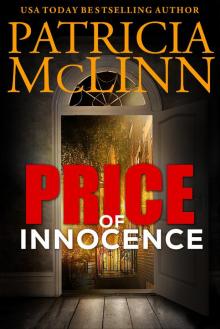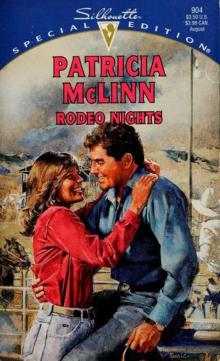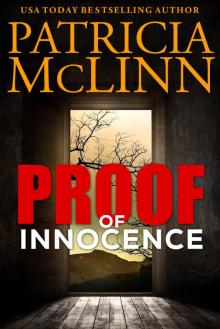- Home
- Patricia McLinn
Sign Off (Caught Dead in Wyoming, Book 1)
Sign Off (Caught Dead in Wyoming, Book 1) Read online
SIGN OFF
Caught Dead In Wyoming
Book 1
Patricia McLinn
Divorce a husband, lose a career … grapple with a murder.
TV journalist Elizabeth “E. M.” Danniher will tell you she committed two sins—she didn’t stay young, and she made an enemy of a powerful news executive—her ex. She used to break national news. Now her top story as the “Helping Out!” reporter at dinky KWMT-TV in Sherman, Wyoming is getting a refund for a defective toaster.
But the case of a missing—or has he been murdered?—sheriff’s deputy is about to introduce her to what happens when people are Caught Dead in Wyoming…
Caught Dead In Wyoming Series
Sign Off
Left Hanging
Shoot First
Last Ditch
Dear Readers: If you encounter typos or errors in this book, please send them to me at: [email protected]. Even with many layers of editing, mistakes can slip through, alas. But, together, we can eradicate the nasty nuisances.
Thank you! – Patricia McLinn
Copyright © 2012 by Patricia McLinn
Kindle Edition
Print ISBN: 978-1-939215-47-5
E-Book ISBN: 978-1-939215-46-8
All rights reserved. No part of this book may be reproduced in any form or by any electronic or mechanical means, including information storage and retrieval systems, without permission in writing from the publisher, except by a reviewer, who may quote brief passages in a review.
Cover design: ArtbyKarri.com
Cover Art: Deb Dixon
Photo Credits:
Truck (manipulated) © Bonita Cheshier | Dreamstime.com
Landscape (manipulated) © Dary423 | Dreamstime.com
Table of Contents
Title Page
About the Book
Copyright Page
Chapter One
Chapter Two
Chapter Three
Chapter Four
Chapter Five
Chapter Six
Chapter Seven
Chapter Eight
Chapter Nine
Chapter Ten
Chapter Eleven
Chapter Twelve
Chapter Thirteen
Chapter Fourteen
Chapter Fifteen
Chapter Sixteen
Chapter Seventeen
Chapter Eighteen
Chapter Nineteen
Chapter Twenty
Chapter Twenty-One
Chapter Twenty-Two
Chapter Twenty-Three
Chapter Twenty-Four
Chapter Twenty-Five
Chapter Twenty-Six
Chapter Twenty-Seven
Chapter Twenty-Eight
Chapter Twenty-Nine
Chapter Thirty
Chapter Thirty-One
Chapter Thirty-Two
Chapter Thirty-Three
Chapter Thirty-Four
From the Author
Dedication
Acknowledgements
Excerpt from LEFT HANGING
About the author
Chapter One
IN JOURNALISM, it’s called a tick-tock.
It’s a piece that recaps a big, ongoing story by hitting each important date and occurrence in order to bring the audience up to date to that very moment.
Tick.
Spewing blood from a battered nose and curses from a mouth of ill repute, Sheriff’s Deputy Foster Redus climbed into his brand new forest green Ford pickup outfitted with flared fenders, chrome brush guard, skid plates and Holley headers and drove into the Wyoming gloaming last fall. It was the Monday after Thanksgiving. That was the last anybody in Cottonwood County admitted to seeing him.
Tock.
That same week, in a land far to the east where the canyons are concrete and the herds are SUVs, I finally opened my eyes to the fact that my divorce decree covered not only a man, but a career.
Tick.
A week before Christmas, the Cottonwood County, Wyoming sheriff arrested Thomas David Burrell, who’d caused the aforementioned spewing of blood and curses, and charged him with murder, though neither Foster Redus nor his pickup had been found.
Tock.
I spent that week in my Illinois hometown with my family, which was evenly divided among considering me a marital failure, wanting to kick some ex-husband butt, and assuring me this would all turn out for the best because I could now get out of that nasty city and nastier business. That three-way split was not among the members of my family, it was within each and every one of them old enough to put sentences together.
It made for a trying week, since I never knew which one-third of a relative I was going to encounter at any given moment.
Tick.
On New Year’s Eve day the Cottonwood County prosecuting attorney dropped the charges against Burrell without prejudice for insufficient evidence.
Tock.
I signed off for the last time from a New York newscast that night. That’s right, after two weeks of vacation, the schedule required me to return for one last shift—why waste a precious commodity like New Year’s Eve off on a has-been?
On April Fool’s day I arrived in Cottonwood County, Wyoming—no cracks about the timing, please—and went on the air the following week as “KWMT-TV’s ‘Helping Out’ reporter E.M. Danniher.”
The gap between New Year’s and April Fool’s Day?
Not a thing happened officially on the Foster Redus case. As for my life, no comment.
That brings you right up to a particular crisp morning in early May in Sherman, Wyoming.
Tick.
Tock.
I’d heard about the Redus case—it was hard not to in KWMT’s newsroom—but it didn’t occupy a lot of my attention. I had my own concerns.
Concerns like figuring out how come LL Bean and Harry and David had no trouble with my change of address, but my ex-husband’s lawyer couldn’t master the concept. Like finding more congenial surroundings (no matter how temporary my stay in Wyoming might be) than the hovel masquerading as a house that I was renting. Like adjusting to a landscape that looked as if it came out of the head of a science fiction writer. Like acclimating to co-workers who treated me either as visiting royalty or a particularly nasty-tempered shark circling their very private swimming hole.
As eighteen second-graders from Lewis and Clark Elementary School and three harassed adults scattered through the KWMT-TV newsroom’s maze of dented desks and mismatched chairs, I was specifically contemplating how to handle anchorman Thurston Fine, who’d botched the intro to my package the night before.
Twice.
At five and ten. Who needs DVR when you have Thurston Fine?
Fine was KWMT’s star—of the variety used for a kindergarten pageant. A pattern traced out on cardboard, covered in tin foil and pinned up—glossy, neat and flat. He so obviously ascribed to the shark school of thought that I found myself looking around for Roy Scheider and Richard Dreyfuss whenever we met. Fine hadn’t stuck a javelin down my throat—yet—but I figured he was looking for the right opportunity.
As a stop-gap measure he had undermined me, on air and off for the past month.
Last night he’d pulled one of the oldest tricks, stopping, as if he’d decided to leave off the last line of his script, then stepping on my first words as I tried to launch into my intro to the piece.
A good news director would have handled it.
KWMT’s news director was Les Haeburn.
Insert philosophical shrug.
“Helping Out” wasn’t Emmy material. It wasn’t even material enough under Haeburn’s dominion to
keep me fifty percent occupied. Maybe I would change that, or maybe I would decide I liked it like this. More likely, it would become moot before long. In the meantime, I had plenty of free time to contemplate the niceties of taking a hunk out of Fine’s leg. Figuratively, of course.
That’s what I was doing when a thin girl with wispy brown hair falling straight at either side of a square face stepped in front of my new professional home, third battleship-gray desk from the windows. Sitting on a chair that only swiveled to the right put me eye-level with this detachment from the second-grade horde.
“Everybody went that way.” I pointed toward the control room door. She wouldn’t want to miss the comedy of Les Haeburn’s steady-hand-at-the-helm routine. Though it might take a somewhat more jaded outlook than a second-grader possessed to see the humor.
“I know.”
Her voice was assured. Her eyes, so dark brown they seemed to be all pupil, stayed on me.
Apparently, she had a need other than reattachment.
“Uh, the bathroom’s over there.” I pointed again.
“I know.” She didn’t move.
Enough of my contemporaries had beaten the biological clock lately that I knew the ground rules about diapers and babies, but where in the developmental continuum trips to the bathroom became a solo venture remained foggy.
“I’ll get your teacher and—”
“You’re Miss Danniher.”
Being recognized is not necessarily the thrill some people imagine. This time, however, a reprieve from potential bathroom duty offset the discomfort.
As my ex-husband took to saying, everything’s a trade-off.
“Yes, I am.”
“On TV. Mrs. George from next door said you’re a consumer advocate.” The girl said the final two words carefully. “So I watched.”
That surprised me. From the little feedback we’d gotten to “Helping Out,” I didn’t think it had any viewers, and here was evidence of two.
When I’d received the assignment, I checked with a few connections, who all said the consumer affairs beat was hotter than ever. But in the four weeks I’d been on-air, I’d gotten a grand total of seven phone calls from viewers, and four were from Ed Radey, who didn’t like his wife’s cooking and wanted me to “help out.” I could come cook or I could take them to dinner, he wasn’t particular.
The girl’s stare intensified, and her thin body leaned over the desk toward me, turning down the corners of the Sherman Independence where it extended beyond the edge. “You help people. You got that man to fix that woman’s toaster.”
“Yes, but not everythi—”
“You told people with problems to tell you and you’d help them.”
The segment tag actually says “KWMT-TV will consider your problem as a potential topic for ‘Helping Out.’ ” I opened my mouth to educate this girl in the denim blue sweater and faded red plaid shirt on the importance of qualifiers such as “will consider” and “potential.” She didn’t wait.
“You’re going to help me.” Not a single qualifier.
“What we do in ‘Helping Out’ is look into your problem and—if we can—we try to find a solution that’s satisfactory to you and the other party.”
“You’re going to help me.”
“Now wait a minute—”
“You’re going to help me keep going to the Circle B and seeing Daddy. He needs me.”
“Someone’s trying to keep you from seeing your Daddy? Who?”
I am not a softy. It was simply the reporter’s instinct to ask questions kicking in.
“Mom and Mr. Haus. He’s her lawyer.”
“Are your parents divorced?”
A solemn nod. “But Mom wants Mr. Haus to get the judge to say Daddy can’t see me anymore.”
Her dark brown eyes might not show color, but they revealed emotion. Mom better not be hoping for roses this Mother’s Day from this offspring—maybe thorns, but definitely no roses.
“Why do you think your mother doesn’t want your father to see you?” Possibilities arose in a mental film clip of too many horrifying news stories. But this child wasn’t wary or withdrawn. And the only fear she seemed to harbor was of not seeing her father.
“She’s mad at him. She’s always been mad at him. Even when I was a baby.”
A woman using a child to punish an ex-spouse? Not unheard of. But why move to cut visitation now if she’d been angry all along?
“Your mother and Mr. Haus think they can get the judge to say your father can’t see you?”
“Yes.” After the single word, her teeth clamped over her bottom lip. Not to stop trembling—it wouldn’t have dared—but to prevent something from escaping.
Nothing gets a reporter’s juices going like somebody keeping a secret. Even somebody younger than my favorite pair of jeans.
“Why do they think that?”
Not a flicker of reaction.
“You know, I can’t help if you don’t tell me the whole story. Just like Mrs. Atcheson with the toaster. She told me everything—when she bought it and where and how much she paid.” A wary blink. “But if you’re not going to tell me, I guess you don’t really want my help. Of course you said you wanted my help, but that’s up to you—”
“He didn’t kill him.”
“What?” If Mrs. Atcheson’s toaster had turned into a Veg-o-Matic before my eyes, I couldn’t have been more surprised. “Who didn’t kill who?”
(I know, I know—it should be who didn’t kill whom—so shoot me.)
“They said he did and they put him in jail, but the man said they couldn’t say Daddy did, so they let him go. But Mom said they couldn’t say Daddy didn’t, so maybe the judge will say Daddy can’t see me. Ever.”
On the edge of my consciousness the sound of a door opening registered, but my attention stayed on the intense, square face leaning toward me.
“Let me get this straight. Your father was accused of killing somebody. But he was released. And your mother’s using the accusation to try to get the judge to rescind his visitation—” Remember the audience. “—to say he can’t see you anymore.”
“Yes. So you have to stop her and Mr. Haus.”
“But who—”
“Tamantha Burrell! What are you doing? The rest of the class is on the bus. You know you’re supposed to stick with the group.”
The least harassed looking of the three adults (likely the teacher since teachers build harassment immunity while parents move on to the germs of a new age) swept up to the thin girl. Smiling at me, she snagged my visitor—Tamantha Burrell, by name, and that information filled in several gaps—in obvious preparation for a speedy exit.
“You tell this nice lady how sorry you are for bothering her and how much you’ve enjoyed seeing how people like her work behind the scenes on a television station.”
Teacher clearly hadn’t followed Tamantha’s lead in watching “Helping Out” and didn’t have the foggiest who I was. She started drawing the girl away.
Tamantha held back long enough for parting words—not the ones her teacher had recommended but a repetition of her unequivocal order:
“You do it.”
* * * *
“YOU’RE NOT.”
The unexpected voice from over my left shoulder made me jump, and the clip I’d been reading fluttered onto a stack of manila-foldered brethren. The amused disbelief in the voice made me irritable.
“There are a lot of things I’m not, Paycik. Including in the mood for a chat with KWMT’s ‘Eye on Sports.’ Go away.”
He didn’t budge.
I stared at him. An attractive man, with the kind of strong bones cameras like, and great hair. Thick and just enough wave to look casual on air without requiring a lot of effort. He wore a crisp soft yellow shirt that would look fine on-air, and jeans battered to the point of fraying, because the news desk masked from the ribcage down.
I should have heard him coming. He wore cowboy boots—honest to goodness cowboy boots. No spurs t
o jingle-jangle, but clunky heels that should have made plenty of noise. Unless a man took special effort to be quiet.
I don’t ascribe to the theory that jocks are stupid per se. Some are, some aren’t. Limited observation of Mike Paycik nudged him provisionally toward the latter category.
For one thing, he’d taken time to get a degree while he was playing college football.
For another, he’d saved money from pro ball to buy a tidy spread, as it was universally described in these parts.
For a third, when doctors said quit torturing those knees or don’t ask them to hold you up, he’d quit.
And for a fourth, when he’d retired last winter, he’d returned home to Cottonwood to start his broadcast journalism career, coming to the spot where he would be forgiven all flubs. When he does burst onto the national scene—and he will, oh, yes, with that voice and those looks, he will—there will be no beginner’s gaffes to pollute the audience’s perception.
A smart move.
However, at the moment, Mike Paycik’s apparent inability to understand English had the “stupid” arrow slipping closer to “is.”
“You’re studying the Burrell case because of what that kid said to you?”
Who’d had time to study? I’d barely confirmed the bits and pieces I’d heard since coming to town.
Burrell acknowledged fighting with Redus the night the deputy was last seen—accounting for bloodstains found in Burrell’s house that matched Redus’ type but not Burrell’s—though the clips didn’t say what the men had fought about. Burrell swore Redus was alive and kicking when they parted, but no one admitted to seeing the alleged victim since.
The clips had explained one mystery Tamantha had left behind.
Going to the Circle B referred to her father’s ranch. When the Independence said Redus had been in Burrell’s ranch house, it wasn’t talking about house design.
“Eavesdropping?” I asked sweetly, leaning against a file cabinet at one end of the windowless cave KWMT grandly called the library. Except for a battered table against one long wall, file cabinets encircled the room. Old tapes occupied shelves above the cabinets. Freestanding shelves down the middle were backed by more filing cabinets. On top bulged cardboard boxes with labels too faded and dusty to read. The only open floor space was a narrow rectangular aisle around the room. “Maybe you got in the habit of listening in on the other team’s huddle in football, but in the real world it’s not polite to eavesdrop on a colleague’s conversation with a source.”

_preview.jpg) Almost a Bride (Wyoming Wildflowers Book 1)
Almost a Bride (Wyoming Wildflowers Book 1)_preview.jpg) Prelude to a Wedding (The Wedding Series Book 1)
Prelude to a Wedding (The Wedding Series Book 1) Reaction Shot (Caught Dead in Wyoming, Book 9)
Reaction Shot (Caught Dead in Wyoming, Book 9) Warm Front
Warm Front Price of Innocence
Price of Innocence Body Brace (Caught Dead in Wyoming, Book 10)
Body Brace (Caught Dead in Wyoming, Book 10) Death on Covert Circle
Death on Covert Circle Making Christmas
Making Christmas Death on Torrid Ave.
Death on Torrid Ave. Death on the Diversion
Death on the Diversion The Rancher Meets His Match
The Rancher Meets His Match Widow Woman
Widow Woman The Runaway Bride
The Runaway Bride Hoops
Hoops A Stranger in the Family (Book 1, Bardville, Wyoming Trilogy)
A Stranger in the Family (Book 1, Bardville, Wyoming Trilogy) Rodeo Nights
Rodeo Nights Wedding Series Boxed Set (3 Books in 1) (The Wedding Series)
Wedding Series Boxed Set (3 Books in 1) (The Wedding Series) Sign Off (Caught Dead in Wyoming, Book 1)
Sign Off (Caught Dead in Wyoming, Book 1) Prelude to a Wedding
Prelude to a Wedding MATCH MADE IN WYOMING
MATCH MADE IN WYOMING Left Hanging
Left Hanging What Are Friends For?
What Are Friends For? Proof of Innocence
Proof of Innocence Hidden in a Heartbeat (A Place Called Home, Book 3)
Hidden in a Heartbeat (A Place Called Home, Book 3) Baby Blues and Wedding Bells
Baby Blues and Wedding Bells Least Likely Wedding?
Least Likely Wedding? Heart Stealers
Heart Stealers Grady's Wedding
Grady's Wedding Right Brother
Right Brother Wedding of the Century
Wedding of the Century Sign Off
Sign Off The Surprise Princess
The Surprise Princess Wyoming Wildflowers: The Beginning
Wyoming Wildflowers: The Beginning